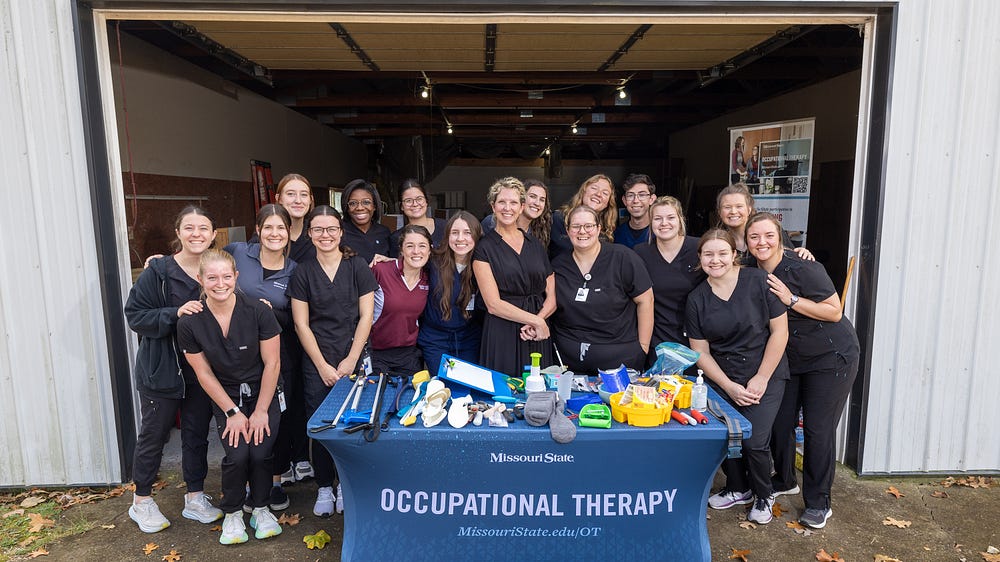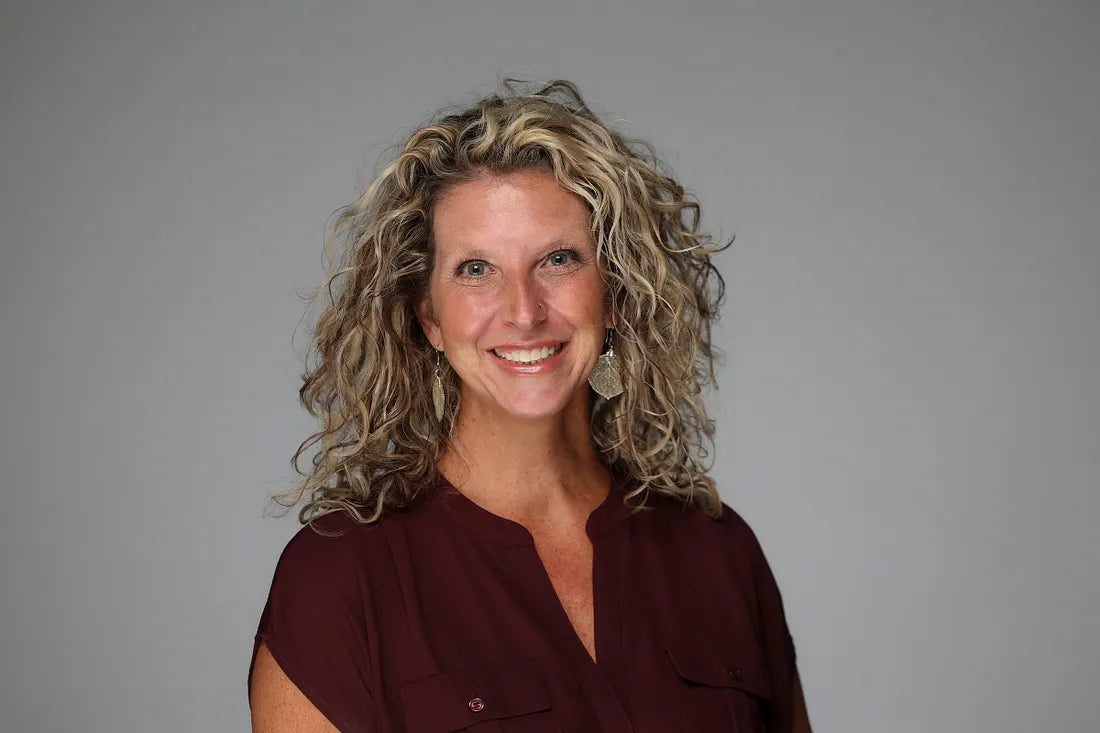
“Prepare to be frustrated with therapy reimbursement and the U.S. payer system.” This may sound naïve, but I wish we could see clients as long as the client felt it was necessary.
Today, more than ever, wellness is at the forefront of societal discussions. From mental health to physical well-being, women are making significant strides in bringing about change, introducing innovative solutions, and setting new standards. Despite facing unique challenges, they break barriers, inspire communities, and are reshaping the very definition of health and wellness. In this series called women in wellness we are talking to women doctors, nurses, nutritionists, therapists, fitness trainers, researchers, health experts, coaches, and other wellness professionals to share their stories and insights. As a part of this series, we had the pleasure of interviewing Ashlea Cardin.
Dr. Ashlea Cardin is a pediatric occupational therapist and associate professor of occupational therapy at Missouri State University. A practitioner with 23 years of experience, she studies health outcomes as they are influenced by clients’ ability to participate in the valued daily activities they want to, need to or must do (AKA: “occupations”). From a wellness standpoint, her work has demonstrated there can be great medicinal value in being “occupied;” as such, occupational therapists are uniquely poised to help clients harness the power of meaningful doing to influence their state of health.
Thank you so much for joining us in this interview series! Our readers would love to “get to know you” better. Can you share your “backstory” with us?
Thank you for inviting me into this space to discuss something I’m passionate about — occupational therapy (OT)! My backstory begins on my first day of life, when I was born with multiple unexpected bone and joint issues. I had club feet, my left arm was swollen and blue, and my hand and fingers weren’t fully formed. This was my, and my parents’, introduction to years of medical and therapy intervention. It was my experience as an OT patient that led me to join this amazing profession. Equally influential was watching my parents learn to manage their fears and navigate my care in a healthcare system designed to focus on the sum of my dysfunctional parts rather than see us as a family unit whose well-being was challenged. My parents’ experience shaped my understanding of healthcare, and to this day, it continues to inform my practice and a research line centered on the experiences of infants and families.
Can you share the most interesting story that happened to you since you started your career? What were the main lessons or takeaways from that story?
I feel like I need to define “occupation” before I tell an OT story. Some people hear occupation and liken it to “vocation.” I can assure you, however, that as a neonatal occupational therapist, I’m not helping premature infants get jobs! Our “occupations” are those extraordinarily ordinary activities we do each day, such as feeding, dressing ourselves, socializing, playing, driving or taking care of our house. Occupations include the tasks, roles and routines that may go unnoticed until a moment comes along when we’re unable do the things we want to do, need to do or must do. When a person is fully able to participate in their uniquely meaningful daily occupations, it contributes to a sense of fulfillment, connectedness, identity and satisfaction. When they cannot, it negatively affects health and well-being.
My career is full of interesting stories, because each day is different; each family I work with has individualized goals for their health and wellness. I think one of the most poignant moments I have had as an occupational therapist was during an interaction with a father whose infant was in the Neonatal Intensive Care Unit. The parents were members of an Old Order Amish community, and I was helping them learn to feed their premature son. During one feeding session, the infant was working hard to breathe and was becoming increasingly pale; therefore, I ended the feeding session. However, concern was not the emotion registered on the father’s face — he was beaming with pride. He stated in his Swiss-German dialect, “That’s my healthy boy. Look how hard you worked.” It was at that moment I realized my definition of health (feeding in an age-appropriate manner) was different than the father’s (the ability to work). My takeaway was as a healthcare professional, I need to seek to understand each client’s definition of health so we’re speaking the same language when working toward wellness goals.
Let’s jump to our main focus. When it comes to health and wellness, how is the work you are doing helping to make a bigger impact in the world?
Occupational therapists are known as the “doing therapists,” which means we’re invested in helping clients across the lifespan and across a wide range of abilities “do” what is meaningful, be or become who they want to be and belong where — and with whom — they wish to belong. Participation in self-directed occupations has been shown to positively influence health by providing a sense of fulfillment and empowerment; promoting enjoyment, happiness and well-being; providing a sense of restoration; and relieving stress. In my work as an occupational therapist and knowing that the inability to participate in valued occupations has health repercussions, it’s my goal to help clients overcome any barriers that may be interfering with their ability to do the things they deem important.
Can you share your top five “lifestyle tweaks” that you believe will help support people’s journey towards better well-being?
1. There is much value in being “occupied,” but balance is key. Not “doing” enough, doing too much or with too much intensity, doing things that are risky or unsafe, or engaging in low-quality life activities are threats to health and well-being.
2. Participating in self-determined autotelic occupations can feel restorative — a key feature of health. Recognize that restorative occupations vary from person to person and may not look like traditional “relaxation.” Restoration can be found in myriad activities, regardless of intensity or activity level, cognitive engagement or structure. For example, baking may feel restorative to some, during which time passes quickly and the client achieves an almost meditative state of intense focus. For others, baking may be a source of stress and emotional fatigue.
3. Our daily occupations are patterned, meaning they are organized through our habits, roles, rituals and routines. If a person is having trouble doing the things they want, need or must do, it’s helpful to examine how one’s daily, weekly or seasonal routines contribute (or are detrimental) to health and well-being.
4. Health is individually constructed; share your definition with your healthcare provider.
5. A defining feature of OT is to assess the influence of the environment (physical, natural, social, etc.) on effective participation in daily life activities. Take a moment to reflect on how the features of your environment may enable (or be barriers to) goal mastery, feelings of happiness and satisfaction, personal development, fulfillment or sense of well-being.
If you could start a movement that would bring the most amount of wellness to the most amount of people, what would that be?
If I could wave a magic wand, I would want everyone to know what OT is and how occupational therapists partner with individuals, groups and populations to promote health and wellness.

What are your “5 Things I Wish Someone Told Me Before I Started” and why?
- “Did you know occupational therapists can work in any setting where people are unable to do the things they deem important? More than traditional medical rehabilitation or medical settings, you could work in rural health, refugee camps, community-based mental health centers, schools, primary care settings, academia, wilderness medicine … just to name a few.”
- “Prepare to be frustrated with therapy reimbursement and the U.S. payer system.” This may sound naïve, but I wish we could see clients as long as the client felt it was necessary.
- “You will, at some point in your career, experience compassion fatigue. What strategies will you use to manage this when, not if, it comes?”
- “Not everyone wants to get better.” This is extremely difficult for most healthcare providers to hear, but occupational therapists honor self-determination.
- “You’ll be given multiple opportunities to speak up for those who may experience occupational injustice or occupational inequity. How knowledgeable are you about your role as a client advocate?”
Sustainability, veganism, mental health, and environmental changes are big topics at the moment. Which one of these causes is dearest to you, and why?
A cornerstone of OT practice is to not only evaluate a person’s capacities within the context of his or her chosen occupations, but to also consider the influence of the physical, social, cultural and natural environments influencing occupational participation. As a profession, there is growing interest and research on the effects of climate change on occupational performance. I can see how climate change is already disrupting some of my clients’ roles as farmers; their confidence and competence are being challenged and it is influencing their health.
What is the best way for our readers to further follow your work online?
Email, the university website or evidence databases.
Thank you for these fantastic insights! We wish you continued success and good health.
About the Interviewer: Wanda Malhotra is a wellness entrepreneur, lifestyle journalist, and the CEO of Crunchy Mama Box, a mission-driven platform promoting conscious living. CMB empowers individuals with educational resources and vetted products to help them make informed choices. Passionate about social causes like environmental preservation and animal welfare, Wanda writes about clean beauty, wellness, nutrition, social impact and sustainability, simplifying wellness with curated resources. Join Wanda and the Crunchy Mama Box community in embracing a healthier, more sustainable lifestyle at CrunchyMamaBox.com.



